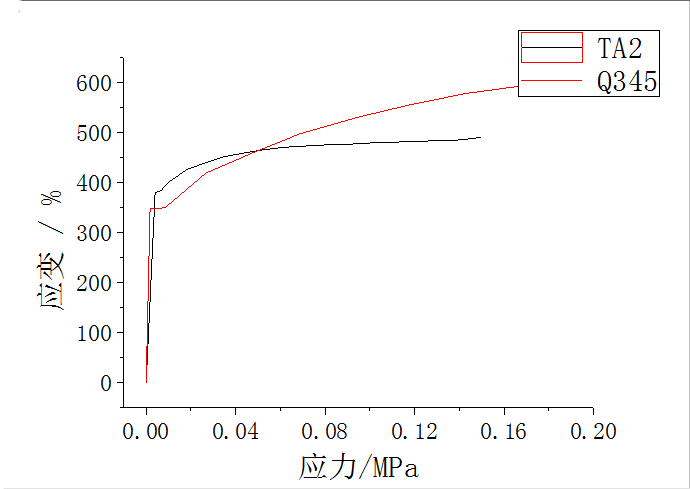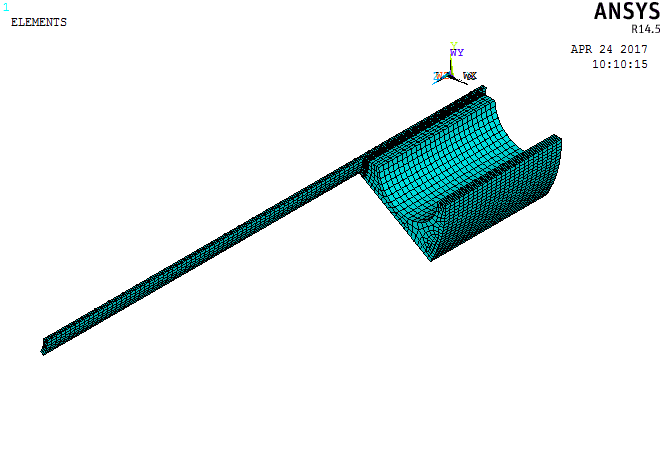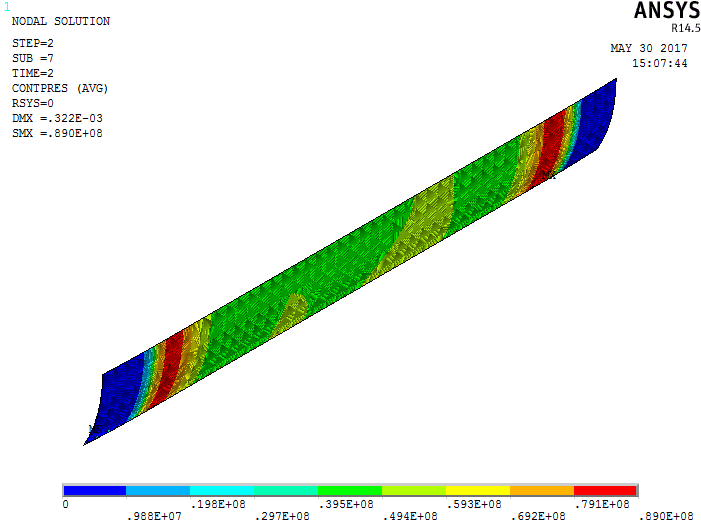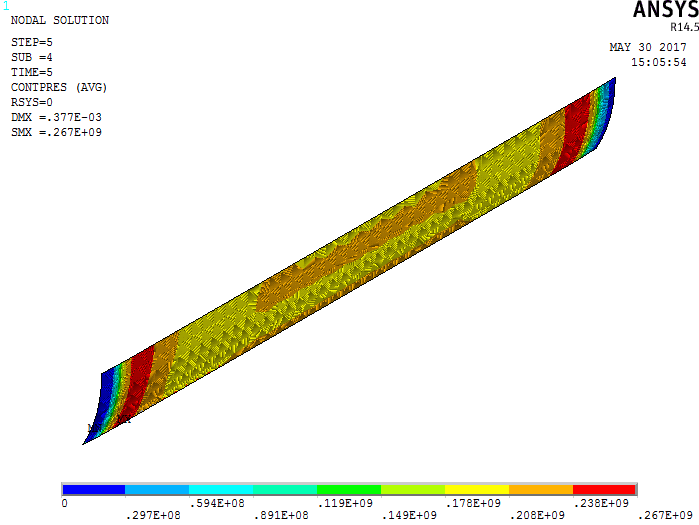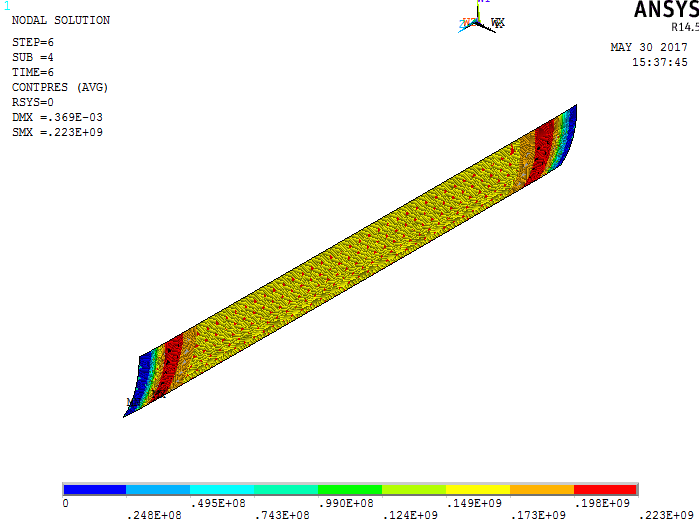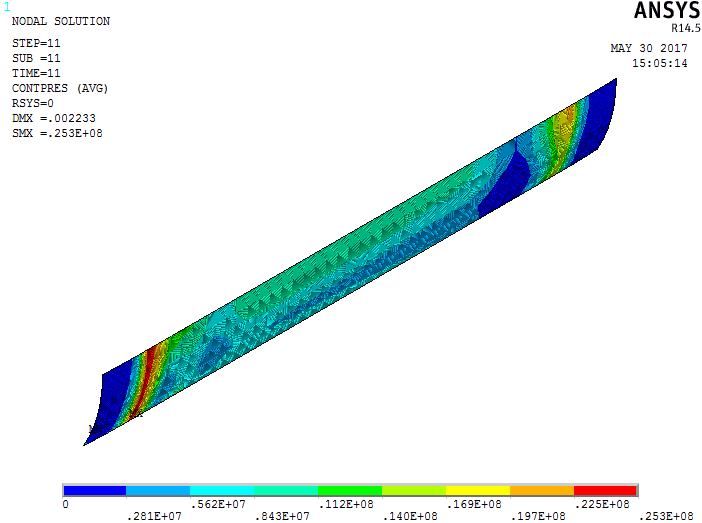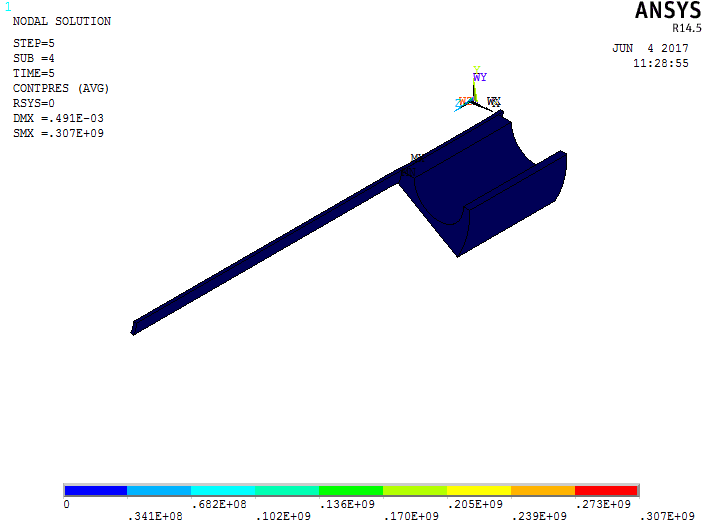钛换热器胀接接头弹塑性有限元模拟毕业论文
2020-06-20 19:14:21
摘 要
钛材因其导热性能良好,耐腐蚀性能和耐热性能良好而受到广泛应用,但钛换热器在一定程度上由于钛材高昂的价格而受到限制。换热器中管子与管板连接接头的可靠性是衡量换热器优良的一个重要标准,所以对管子与管板的连接接头的研究意义很大。当前,液压胀接是一种有效的连接方式,在一定程度上可保证其性能。
本文主要讨论的是钛换热管与管板的液压胀接接头的连接性能。首先根据理论计算确定胀接参数,建立有限元七孔管板模型,再通过 模拟分析初始间隙,管间距和胀接压力对残余接触压力的影响。
模拟分析初始间隙,管间距和胀接压力对残余接触压力的影响。
通过本文的研究,得到以下结论:初始间隙对残余接触压力和拉脱力的影响都不是很大,基本在一定的范围内徘徊,初始间隙在0.2mm到0.3mm时,残余接触压力下降的缓慢,超过0.3mm时下降迅速;初始间隙为0.15mm时,拉脱力的值最大。管间距从32mm变化到32.5mm时,平均残余接触压力减小量最小,管间距为32mm时,拉脱力最大。胀接压力与残余接触压力和拉脱力基本成正比,胀接压力为260MPa时,残余接触压力为5.9MPa,拉脱力为3627.0871N;胀接压力为300MPa时,残余接触压力为12.295MPa,拉脱力为8041.3872N。管板厚度度残余接触压力基本无影响,但与拉脱力成正比。
关键词:钛换热器;有限元模拟;残余接触压力;拉脱力
Elastoplastic Finite Element Simulation of Expansion Joint of Titanium Heat Exchange Tube
ABSTRACT
Titanium material because of its good thermal conductivity, corrosion resistance and good heat resistance and has been widely used, but the titanium heat exchanger to a certain extent due to the high price of titanium is limited.The reliability of the joint between the pipe and the pipe plate in heat exchanger is an important criterion to measure the heat exchanger. At present, the hydraulic expanding connection is an effective, to a certain extent can guarantee its performance.
This paper is mainly about the titanium heat pipe and pipe plate joint, first of all, according to the theoretical calculation to determine the expansion parameter, then the finite element model of seven tube plate. Simulation of initial clearance by ANSYS, influence of tube pitch and expanding pressure on the residual contact pressure.
Through this research, get the following conclusions: the influence of initial clearance on the residual contact pressure and the pulling force is not large, the basic hovering in a certain range, the initial gap in 0.2mm to 0.3mm, the residual contact pressure decreased slowly, more than 0.3mm decreased rapidly; the initial gap is 0.15mm, the maximum pull-out force the tube spacing changes from 32mm to 32.5mm, the average residual contact pressure reduction is minimum, tube spacing is 32mm, the maximum pull-out force. The expanding pressure and the residual contact pressure and the pulling force is proportional to the expanding pressure is 260MPa, residual The contact pressure is 5.9MPa, the pull-out force is 3627.0871N; the expanding pressure is 300MPa, the residual contact pressure of 12.295MPa and 8041.3872N. pull-out force of tube plate thickness has almost no effect on the residual contact pressure. But the effect of tube plate thickness on the pull-out force is relatively large, the thicker the tube plate, the pull-out force is greater.
Key words: titanium heat exchanger; finite element simulation; expansion pressure; initial clearance; pipe spacing; residual contact pressure
目录
摘要............................................................................................................................I
ABSTRACT...............................................................................................................II
第一章 绪论 1
1.1 引言 1
1.2 钛换热器 1
1.3 液压胀接技术 1
1.3.1 液压胀接的原理 1
1.3.2 液压胀接的方法 1
1.4 管子与管板液压胀接的相关研究 2
1.4.1 有关液压胀接压力的研究 2
1.4.2 有关残余接触压力的研究 3
1.4.3 有关开槽情况的研究 3
1.4.4 有关液压胀接接头拉脱力的研究 3
1.4.5 有关摩擦系数的研究 3
1.5 本文研究的主要内容 3
第二章 液压胀接原理及有限元模型 5
2.1 液压胀接原理 5
2.1.1 换热管的弹塑性变形 5
2.1.2 管板的弹塑性变形分析 5
2.1.3 最大胀接压力及胀接压力的分析 6
2.2 拉脱力的理论计算 8
2.3 有限元模型 8
2.3.1 换热管与管板的胀接结构 8
2.3.2 换热管与管板的有限元建模 9
2.3.3 液压胀接接头的分析结果 12
2.4 比较分析 15
2.5 本章小结 15
第三章 残余接触压力的分析 16
3.1 初始间隙对残余接触压力的影响 16
3.2 管间距对残余接触压力的影响 16
3.3 胀接压力对残余接触压力的影响 17
3.4 管板厚度对残余接触压力的影响 18
3.5 本章小结 19
第四章 拉脱力的分析 20
4.1 胀接压力对拉脱力的影响 20
4.2 初始间隙对拉脱力的影响 20
4.3 管间距对拉脱力的影响 21
4.4 管板厚度对拉脱力的影响 22
4.5 本章小结 23
第五章 总结与展望 24
5.1 总结 24
5.2 展望 24
致谢 25
参考文献 26
主要符号说明 28
- 绪论
- 引言
换热器是能实现物料之间热量传递的一种设备,能够将热量从温度较高的流体传递给温度较低的流体,在化工、能源、石油、轻工、食品、制药、机械及其他工业部门有着广泛的应用。由于工作条件和物料特性的不同,出现了各种不同形式的换热器,而管壳式换热器由于其生产成本低、结构坚固、可靠性高、选用的材料范围广泛、易于制造、换热表面易于清理,能承受较高的操作压力和温度而被广泛使用。
钛是一种具有银白色光泽的稀有金属,熔点高,线膨胀系数小,热导率差,其可以分为通用材料和特殊材料,通用材料包括钛合金和工业纯钛。
- 钛换热器
钛换热器是一种由钛管制成的换热设备[1]。在物理性质上,钛密度小,耐高温,比强度高,弹性模量小,质量轻,传热效果好等优点;在化学性质上,具有良好的耐腐蚀能力。由于钛换热器的金属离子相对稳定,所以使用寿命相对较长。此外,因其体积小,换热能力大等特点,在工业上得到了越来越多的使用。目前,钛换热器的形式有全钛结构,衬钛结构,钛-钢复合板三种[2]。由于钛材高昂的费用,使得钛换热器在工程上的使用被限制,因此,从经济的角度考虑,钛-钢复合板做管板的换热器是比较合理的选择。
相关图片展示:
